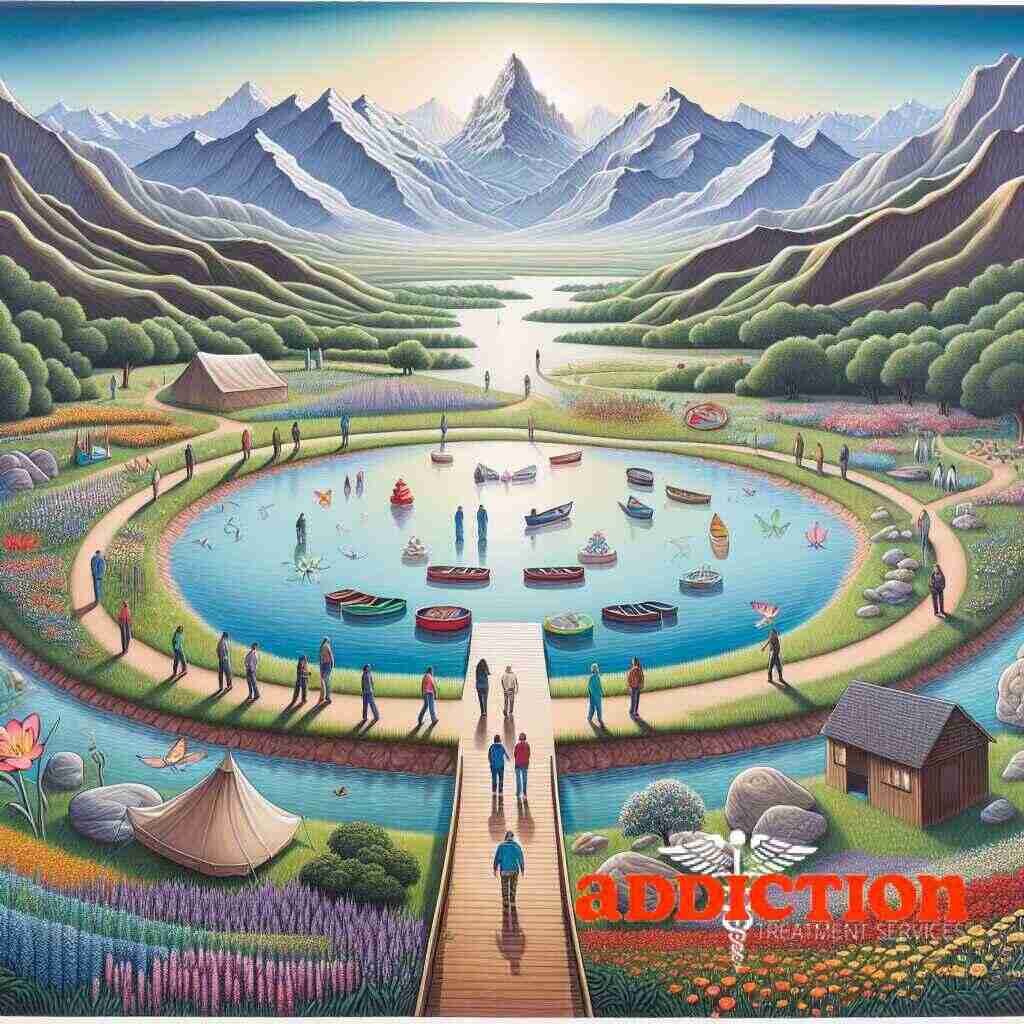 Posted On: 03/24/2024
Posted On: 03/24/2024Embarking on the Journey to Recovery
Understanding the Role of Medication-Assisted Treatment in Combating Substance Use Disorders
Medication-Assisted Treatment (MAT) is an innovative and effective approach used in the management and treatment of substance use disorders, particularly those related to opioids and, in some cases, alcohol. MAT combines pharmacological interventions with comprehensive behavioral counseling to provide a “whole-patient” approach to substance abuse treatment. The medications employed in MAT programs are approved by the FDA and are specifically designed to reduce withdrawal symptoms and cravings, helping individuals to maintain a stable state while engaging in therapy and rebuilding their lives. This integrated treatment model has been proven to not only improve patient survival rates but also to increase retention in treatment programs, thereby enhancing the recovery process.
The Importance of Seeking Professional Help Early
Initiating the journey toward recovery at the earliest sign of substance abuse is critical. Early intervention can significantly impact the long-term outcomes for individuals struggling with addiction. Seeking professional help from accredited addiction treatment centers or specialist healthcare providers can pave the way for a more effective recovery process. Professional settings offer structured support, ensuring that individuals receive the appropriate level of care tailored to their specific needs. Furthermore, early engagement in treatment can prevent the escalation of substance use to more severe levels, limiting the potential for long-term health complications or the development of co-occurring mental health disorders.
Navigating the Initial Steps of Addiction Recovery in Utah
The first step towards addiction recovery in Utah involves recognizing the need for help and understanding that addiction is a complex but treatable disorder. Once this realization is made, the next step is to research and select a reputable treatment provider that offers MAT programs. Utilizing online directories and resources, such as Utah addiction recovery, can simplify this process by connecting individuals with trusted local treatment centers. It’s important to verify the credentials of the treatment provider, understand the specifics of their MAT program, and ensure they offer a comprehensive approach to recovery that includes both medication and behavioral therapies. Engaging in a preliminary assessment with a healthcare professional will help tailor the treatment plan to the individual’s unique needs, setting the groundwork for a successful recovery journey.
Medication-Assisted Treatment (MAT) Explained
The Science Behind Medication-Assisted Treatment
Medication-Assisted Treatment (MAT) represents a groundbreaking approach in the battle against opioid addiction and other substance use disorders, underpinned by a foundation of scientific research and clinical evidence. At its core, MAT integrates the use of FDA-approved medications with counseling and behavioral therapies to treat substance use disorders. The science behind MAT is rooted in its ability to normalize brain chemistry, block the euphoric effects of alcohol and opioids, relieve physiological cravings, and stabilize body functions without the negative effects of the abused drugs. This combination of medication and therapy effectively addresses the holistic needs of individuals, supporting both physical recovery and psychological well-being. By mitigating withdrawal symptoms and reducing cravings, MAT enables individuals to engage more fully in their recovery processes, including therapy and support services, laying a firm foundation for long-term recovery.
Common Medications Used in MAT Programs
Several FDA-approved medications are pivotal to the success of Medication-Assisted Treatment programs, each tailored to address specific aspects of addiction and recovery. For opioid use disorders, three primary medications are commonly prescribed: Methadone, which reduces cravings and withdrawal symptoms without producing the high associated with opioid misuse, Buprenorphine, which also curbs cravings and withdrawal effects while offering a ceiling on opioid effects to reduce misuse potential, and Naltrexone, which blocks opioid receptors, preventing opioids from having an effect. For alcohol use disorders, medications like Disulfiram, Acamprosate, and Naltrexone are employed to support abstinence and reduce cravings. These medications for addiction in Utah and elsewhere are integral components of a comprehensive MAT regimen, facilitating the recovery journey by addressing the physiological elements of addiction.
How MAT Facilitates Comprehensive Recovery from Opioid Addiction and Other Substance Use Disorders
Medication-Assisted Treatment (MAT) transcends the outcomes of traditional addiction treatment methods by providing a multifaceted approach to recovery. Beyond merely alleviating withdrawal symptoms and curbing cravings, MAT programs are designed to facilitate comprehensive recovery from opioid addiction and other substance use disorders. The integration of medication with counseling and behavioral therapies addresses the whole person, promoting changes in behavior, improving patient survival, and enhancing the ability to maintain gainful employment and stable relationships. MAT’s effectiveness lies in its ability to provide a bridge to recovery-supporting patients as they work to rebuild their lives and achieve sustained sobriety. By fostering an environment of support and accountability, MAT helps individuals navigate the complex terrain of recovery, ensuring they have the resources and resilience to overcome the challenges of addiction. Through this comprehensive approach, MAT significantly contributes to reducing the risk of relapse and supporting long-term recovery, highlighting its critical role in addiction treatment and the broader public health landscape.
Finding the Right MAT Program in Utah
Criteria for Selecting an Effective MAT Clinic
When searching for a Medication-Assisted Treatment (MAT) clinic in Utah, it’s essential to consider several criteria to ensure you choose an effective and supportive program. Firstly, look for clinics that offer comprehensive services, including both medication support and behavioral therapies. An integrated approach to treatment supports both the physiological and psychological aspects of addiction recovery. Secondly, verify the clinic’s credentials and the qualifications of its healthcare providers. Ensuring that the clinic operates under state and federal guidelines adds an extra layer of trust and security in the quality of care provided.
It’s also crucial to assess the clinic’s approach to patient care. Opt for clinics that personalize treatment plans to fit individual needs rather than offering a one-size-fits-all program. Patient-centric care, which may include group therapy, individual counseling, and family therapy options, is indicative of a clinic’s commitment to addressing the unique challenges and needs of each person. Lastly, consider the clinic’s track record of success, including patient testimonials and retention rates, which can offer valuable insights into the effectiveness of their MAT programs.
Utah Addiction Recovery Services’ Role in Your Search
Utah Addiction Recovery Services plays a pivotal role in guiding individuals towards finding suitable MAT programs in Utah. By offering a comprehensive directory of vetted addiction treatment centers and detailed information about the available services, Utah Addiction Recovery Services simplifies the process of identifying qualified MAT clinics. Their resources not only provide clarity on the different types of MAT programs available but also highlight clinics that specialize in treating specific substance use disorders, offering a targeted approach to recovery.
Moreover, Utah Addiction Recovery Services offers personalized assistance and support in navigating the complexities of finding the right treatment option. Their expertise in the field of addiction recovery ensures that individuals have access to current and reliable information, making the search for effective MAT programs less daunting and more straightforward.
Utilizing Online Directories to Find Utah Addiction Specialists
In the digital age, online directories have become invaluable tools in the search for MAT clinics and addiction specialists in Utah. These directories offer a centralized platform where individuals can find comprehensive listings of treatment options, including outpatient and residential treatment centers that provide MAT. By featuring detailed profiles of each clinic, including their treatment philosophies, services offered, and patient reviews, online directories help individuals make informed decisions about their care.
Accessing these directories is simple and offers a discreet way for individuals or their family members to explore available addiction treatment services near them. Most directories also include filters to narrow down search results based on location, treatment options, insurance requirements, and other critical factors, further customizing the search to meet individual needs. Through these online resources, finding specialized healthcare providers for addiction recovery, including those offering MAT, becomes a more accessible and less overwhelming task.
By leveraging the criteria for selecting effective MAT clinics, utilizing the supportive role of Utah Addiction Recovery Services, and exploring online directories, individuals seeking recovery can find the resources and professional support necessary to embark on a successful treatment journey in Utah.
Starting Your MAT Treatment in Utah
The Admission Process for MAT Programs
Embarking on the journey to overcome substance use disorders through Medication-Assisted Treatment (MAT) in Utah commences with the admission process-a critical first step that paves the way towards recovery. Initially, individuals interested in MAT programs are required to reach out to a treatment provider, which can be identified through resources such as the addiction treatment options Utah. This first contact involves a pre-assessment, typically over the phone or through a scheduled in-person meeting, designed to gather essential information about the individual’s substance use history, current health status, and treatment goals.
Following this, a more comprehensive evaluation is conducted by healthcare providers at the MAT clinic. This evaluation includes medical examinations, psychological assessments, and discussions about the individual’s addiction history and previous treatment experiences, if any. The purpose of this in-depth evaluation is to ensure that the MAT program aligns with the individual’s specific needs, maximizing the chances for a successful recovery.
What to Expect During Your First Visit to a MAT Clinic
Your initial visit to a MAT clinic marks a significant milestone in your journey to recovery. Expect this visit to be informative and structured, aimed at establishing a foundation for your treatment plan. During this visit, you’ll meet with a team of healthcare providers, including doctors, nurses, and counselors, who specialize in addiction medicine. These professionals will conduct a series of assessments that are crucial in designing your treatment plan. These assessments often encompass a medical examination, mental health evaluation, and an in-depth discussion about your substance use history.
Additionally, this visit serves as an opportunity for you to ask questions and express any concerns you might have about the MAT process. It’s essential to discuss openly with your healthcare provider any apprehensions, expectations, and goals you have regarding your treatment. You’ll also receive detailed information about the specifics of the MAT program, including the medications used, the expected duration of the treatment, counseling and therapy options, and any necessary lifestyle adjustments.
Collaborating with Healthcare Providers for a Customized Treatment Plan
A cornerstone of effective MAT in Utah is the collaboration between you and your healthcare providers to develop a customized treatment plan tailored to your unique needs. This treatment plan is not a static document but a dynamic blueprint for recovery that may evolve as you progress through the program. It integrates medication protocols with behavioral therapies, counseling sessions, and support services, designed to address both the physical and psychological aspects of addiction.
During this collaborative process, it’s vital for you to communicate openly with your healthcare team about your experiences, challenges, and progress. Your feedback enables your providers to adjust the treatment plan as necessary, ensuring it remains aligned with your evolving needs and recovery goals. Additionally, this partnership empowers you to take an active role in your recovery journey, reinforcing your commitment to achieving and maintaining sobriety.
In Utah, access to Medication-Assisted Treatment is facilitated through comprehensive care models that prioritize patient-centered approaches, integrating evidence-based medications with personalized therapy and support services. By understanding the admission process, setting realistic expectations for your first clinic visit, and actively collaborating with healthcare providers, individuals seeking MAT can embark on a path towards sustainable recovery and improved quality of life.
Comprehensive Care: Beyond Medication

Integrating Behavioral Health Services and Mental Health Services into MAT
Medication-Assisted Treatment (MAT) in Utah encompasses much more than the administration of medications to alleviate withdrawal symptoms and curb cravings. Integral to the MAT approach is the inclusion of behavioral health services and mental health services, offering a holistic pathway to recovery. This integration is crucial as substance use disorders often coexist with mental health issues such as depression, anxiety, and post-traumatic stress disorder (PTSD). By addressing these comorbid conditions simultaneously, MAT programs provide a comprehensive treatment strategy that tackles the root causes of substance misuse.
Behavioral therapies, including Cognitive Behavioral Therapy (CBT), Motivational Interviewing (MI), and Contingency Management (CM), play a pivotal role in this integrated approach. These therapies empower individuals to modify their behavior patterns, develop coping strategies for dealing with stress and triggers, and enhance their motivation for recovery. Mental health services, on the other hand, provide the necessary support for managing co-occurring mental health conditions, ensuring that individuals receive the comprehensive care they require to achieve lasting recovery.
The Importance of Support Networks in Recovery
An often underestimated yet critical component of the recovery process is the support network. Whether through group therapy sessions, family involvement, or recovery communities, having a robust support system significantly enhances the effectiveness of MAT and the overall recovery journey. These support networks offer emotional encouragement, practical advice, and shared experiences that foster a sense of belonging and mutual understanding.
In Utah, addiction recovery communities and support groups such as Narcotics Anonymous (NA) and Alcoholics Anonymous (AA) provide invaluable peer support, promoting sustained sobriety and offering a platform for individuals to share their stories and learn from others who have faced similar challenges. Family members and loved ones also play a foundational role in the recovery process, providing emotional support and understanding that can greatly increase the chances of successful recovery. Recognizing and nurturing these support networks are essential steps in ensuring a comprehensive and holistic approach to overcoming substance use disorders.
Utilizing Outpatient and Residential Treatment for Holistic Recovery
For those embarking on the path to recovery in Utah, choosing between outpatient and residential treatment options can significantly influence their journey. Both modalities offer distinct benefits and cater to different needs and preferences. Outpatient treatment, as represented by opioid treatment in Utah, allows individuals to receive therapy and medication assistance while maintaining their daily responsibilities. This flexibility can be particularly beneficial for those who have strong support systems at home or who are in the early stages of addiction.
Conversely, residential treatment programs provide a more immersive recovery experience. Participants live on-site at the treatment facility, ensuring they have constant access to medical and therapeutic support in a structured environment. This intensive level of care is often suited to individuals with more severe substance use disorders or those who require a safe and supportive environment away from potential triggers and stressors. Whether choosing outpatient care for its flexibility and integration into everyday life or opting for the immersive support of residential treatment, the goal remains the same-achieving a holistic recovery that addresses not just the physical aspects of addiction but the emotional and psychological facets as well.
Understanding the spectrum of care options, from medication to mental health support and the choice between outpatient and residential treatments, is vital for individuals in Utah seeking a comprehensive approach to recovery. Through integrated care models that address the multifaceted nature of substance use disorders, lasting recovery can be achieved, offering individuals the chance to reclaim their lives and embrace a brighter, substance-free future.
The Road to Long-Term Recovery
Establishing a Relapse Prevention Plan
Navigating the path of recovery from substance use disorders in Utah-or anywhere else-doesn’t end with the conclusion of a medication-assisted treatment (MAT) program. A critical component of sustaining long-term recovery is establishing a relapse prevention plan. This tailored strategy involves identifying triggers, developing coping mechanisms to deal with those triggers, and outlining clear steps to take should the risk of relapse emerge.
A relapse prevention plan is crafted in collaboration with healthcare providers and often incorporates input from therapists, family members, and the individuals themselves. Such plans may include regular participation in therapy sessions, attendance at support group meetings, and continuous monitoring and adjustment of medication-assisted therapy in Utah. Engaging in healthy lifestyle changes, such as adopting a regular exercise regime, maintaining a balanced diet, and ensuring adequate sleep, also forms a critical part of this prevention plan. These holistic approaches reinforce the skills needed to manage stress and navigate the challenges of recovery without turning back to substance use.
Learning Critical Life and Coping Skills
An essential facet of achieving lasting recovery is the acquisition of life and coping skills. These abilities empower individuals to handle the stresses and challenges of daily life without relapsing into substance use. Medication-assisted treatment programs in Utah often incorporate training sessions that focus on skill development, including time management, financial planning, effective communication, and emotional regulation.
Moreover, coping skills are particularly vital for managing situations or emotions that previously triggered substance use. This can include techniques for mindfulness, such as meditation and breathing exercises, as well as strategies for avoiding high-risk scenarios. Learning to establish and maintain healthy boundaries in personal and professional relationships is also a key skill that supports long-term recovery. These skills not only aid in preventing relapse but also contribute to improving overall quality of life, fostering personal growth, and enhancing social relationships.
Engagement in Recovery Support Services and Community Resources
Sustained recovery from substance use disorders is significantly bolstered by engaging with recovery support services and community resources. Utah offers a wealth of options, including support groups like Narcotics Anonymous (NA) and Alcoholics Anonymous (AA), which provide peer support and a sense of belonging. These groups help individuals share their experiences, gain insights from others who have faced similar challenges, and learn new strategies for maintaining sobriety.
In addition to peer support groups, Utah recovery services and various Utah addiction resources offer access to educational workshops, employment assistance, and housing support for those in recovery. Such services are designed to address the broad spectrum of needs that individuals may encounter during their recovery journey, facilitating a more comprehensive approach to healing and reintegration into society.
By leveraging these community resources and support services, individuals in recovery can build a robust support network, enrich their understanding of addiction and recovery, and navigate the challenges of life post-treatment with confidence. This engagement not only aids in preventing relapse but also enriches the individual’s life with purpose, connection, and the joy of helping others on their path to recovery.
Special Considerations in MAT
Addressing the Needs of Unique Populations
Medication-Assisted Treatment (MAT) in Utah, as in other regions, must cater to the varied demographics and unique needs of its population. Substance use disorders do not discriminate, affecting individuals from diverse backgrounds, each with their own challenges and requirements for successful treatment. Special populations, including pregnant women, adolescents, veterans, and those with co-occurring mental health disorders, necessitate tailored approaches in MAT programs. For instance, pregnant women struggling with substance use require specialized Utah addiction medicine protocols to ensure the safety and health of both mother and child, balancing the mitigation of withdrawal symptoms with the prevention of harm.
For adolescents, engaging in MAT necessitates a delicate balance of pharmacological treatment and family involvement, recognizing the developmental and social factors unique to this age group. Similarly, veterans may benefit from MAT programs that integrate services for trauma or PTSD, given the high prevalence of these conditions within this population. Customization of MAT programs to meet the needs of these unique populations underscores the importance of a holistic, patient-centric approach, ensuring accessibility and effectiveness of treatment for all.
The Impact of Legislation on Access to MAT in Utah
Legislation plays a pivotal role in shaping access to Medication-Assisted Treatment in Utah and beyond. Federal and state laws, along with regulatory policies, can significantly impact the availability and scope of MAT services. Recent legislative efforts have aimed to broaden access to MAT by easing restrictions on prescribing medications such as buprenorphine, expanding the role of telemedicine in addiction treatment, and securing funding for MAT programs. However, despite progress, regulatory hurdles and insurance coverage issues still impede many individuals from accessing the MAT services they need.
In Utah, ongoing advocacy and legislative reform are crucial to eliminate these barriers and improve access to MAT. This includes pushing for policies that support insurance parity for substance use disorders, reducing bureaucracy in the credentialing of MAT providers, and ensuring that state Medicaid programs offer comprehensive coverage for MAT services. By understanding and navigating the local legislative landscape, healthcare providers, and advocates can work together to enhance the availability and affordability of MAT for those in need.
Coordinating Care with Primary Health Providers
Successful Medication-Assisted Treatment programs in Utah emphasize the importance of care coordination between MAT clinics and primary health providers. Such collaboration ensures a continuum of care that addresses not only substance use disorders but also the broader health concerns of individuals undergoing MAT. Primary health providers play a pivotal role in identifying early signs of substance misuse, referring patients to MAT programs, and managing concurrent medical conditions that can impact recovery outcomes.
Coordinating care involves regular communication between MAT specialists and primary healthcare teams, sharing treatment plans, progress updates, and adjusting care as necessary to meet the patient’s evolving needs. Utilizing case management systems and healthcare information exchange platforms can facilitate this collaboration, ensuring that all parties involved in a patient’s care have access to up-to-date medical information. By bridging the gap between specialized addiction treatment and general healthcare, care coordination enhances patient support throughout the recovery journey, leading to better health outcomes and a higher likelihood of sustained recovery from substance use disorders.
A Beacon of Hope for Families

The Role of Family Members in the Addiction Recovery Process
Family involvement is instrumental in the addiction recovery process, offering a foundation of support, understanding, and love that significantly enhances the efficacy of Medication-Assisted Treatment (MAT) in Utah. Recognizing the critical role of family members, it’s essential they are equipped with the knowledge and tools needed to effectively support their loved one.
Family members serve multiple functions in the recovery journey-acting as motivators, accountability partners, and emotional anchors. Their participation in counseling sessions and family therapy can help mend relationships strained by the challenges of substance misuse, fostering an environment conducive to healing and growth. Additionally, by understanding the complexities of addiction and the principles of MAT, family members can help dispel stigmas surrounding substance use disorders, creating a more supportive and less judgmental atmosphere at home.
Moreover, families can aid in monitoring the progress of treatment, encouraging adherence to medication protocols, and assisting in recognizing early signs of potential relapse. Through active involvement in the recovery process, families not only contribute to the well-being of their loved one but also undergo a healing and educational journey themselves, strengthening the familial bond and resilience against future adversities.
Resources and Support for Families of Individuals in MAT
Navigating the complexities of Medication-Assisted Treatment (MAT) and the broader recovery process can be overwhelming for families of individuals battling substance use disorders. Recognizing this, a variety of resources and support services are available in Utah to assist families in this crucial role.
Support groups specifically designed for families, such as Al-Anon and Nar-Anon, offer a platform where family members can share their experiences, learn from others in similar situations, and cultivate coping mechanisms that foster personal well-being while supporting their loved one in recovery. These groups emphasize the importance of self-care, reinforcing the concept that taking care of oneself is not a selfish act but a necessity to be an effective support for others.
Additionally, addiction recovery Utah provides access to educational workshops and seminars aimed at demystifying addiction and the recovery process for families. Understanding the science behind substance use disorders, the objectives of MAT, and the principles of effective communication can empower families to become invaluable allies in the recovery journey.
Furthermore, family therapy offered by many Utah MAT clinics and treatment centers can facilitate open dialogue, resolve underlying issues, and strengthen relationships during this transformative period. By tapping into these resources and support services, families can better navigate the challenges and rewards of supporting a loved one through recovery.
Navigating Financial and Insurance Considerations for MAT
The financial aspect of accessing Medication-Assisted Treatment (MAT) poses significant concerns for many families in Utah. Understanding and navigating insurance coverage, treatment costs, and available financial assistance programs are essential steps in ensuring that loved ones receive the care they need without placing undue financial strain on the family.
Most insurance plans, including Medicaid in Utah, cover parts of MAT, including medications and counseling sessions. However, coverage levels and out-of-pocket expenses can vary widely depending on the plan and provider. Families are encouraged to communicate directly with their insurance company to gain a clear understanding of what treatments are covered, any necessity for pre-authorizations, and details regarding copayments and deductibles.
For families facing financial hurdles that insurance does not cover, exploring options for financial assistance is crucial. Many treatment programs offer sliding scale fees based on income, payment plans that spread out the cost over time, or even scholarships for those who meet specific criteria. Additionally, nonprofit organizations and community groups sometimes provide grants or assistance specifically designed to support individuals accessing MAT and their families.
Seeking guidance from financial counselors at treatment centers or independent financial advisors who are knowledgeable about healthcare costs can also provide families with strategies and resources to manage the financial aspects of MAT effectively. Through diligent research and leveraging available resources, families can navigate the financial and insurance considerations associated with MAT, ensuring their loved one receives the necessary treatment without compromising the family’s financial security.
Conclusion: Embracing a New Horizon
The Transformative Power of MAT in Addiction Recovery
Medication-assisted treatment (MAT) has proven to be a cornerstone in the fight against substance use disorders, particularly in states like Utah where communities are increasingly seeking effective solutions for opioid addiction treatment and beyond. Medication-assisted therapy Utah has demonstrated a transformative power, reshaping the landscape of addiction recovery by providing individuals with a more manageable path toward overcoming dependency. By integrating FDA-approved medications with counseling and behavioral therapies, MAT addresses both the physical and psychological facets of addiction, enabling a more holistic and sustained recovery.
The efficacy of MAT isn’t just in its ability to reduce withdrawal symptoms and cravings, it’s also in its capability to restore a sense of normalcy and function in the lives of those affected by substance use disorders. This approach renews hope, offering individuals a tangible solution that supports their journey towards a healthier, substance-free life. As recognition of its transformative power grows, so does the accessibility to these critical services across Utah, fostering a more supportive and understanding environment for those seeking help.
The Importance of Continuity of Care and Long-Term Support
Continuity of care and long-term support are pivotal elements in the success of MAT and the broader spectrum of addiction recovery processes. Substance use disorders, characterized by their chronic nature, necessitate an ongoing commitment to recovery both from individuals and the healthcare systems that support them. This means that the journey doesn’t end upon the conclusion of a MAT program, instead, it requires a lifelong dedication to maintenance and support.
Utah recovery services underscore the importance of continued engagement in supportive services such as counseling, peer support groups, and wellness activities to sustain the gains achieved through MAT. Long-term support includes regular check-ins with healthcare providers, participation in community resources, and sometimes continued medication management. These strategies work together to prevent relapse, manage stressors, and cultivate a healthy, fulfilling lifestyle post-recovery.
How Addiction Treatment Services Continues to Support Your Journey
Addiction Treatment Services remains a beacon of support and guidance for individuals navigating the challenging waters of recovery in Utah and beyond. With a comprehensive directory of reputable addiction treatment centers and a wealth of resources on addiction treatment services near you, we are committed to simplifying the search for quality care. Whether you’re in the initial stages of seeking help or you’re looking for long-term support options, Addiction Treatment Services provides detailed information on a wide array of treatment modalities, including MAT, outpatient and residential treatment, and specialized programs.
Our mission is to empower you with knowledge and access to the addiction that Utah residents need to embark on a successful recovery journey. Through our platform, you can connect with Utah MAT clinics and other treatment facilities that meet your specific needs, ensuring that you receive personalized and effective care. As you continue on your path toward healing and sobriety, remember that Addiction Treatment Services is here to support you every step of the way, offering guidance, resources, and hope for a brighter, substance-free future.
Frequently Asked Questions
Question: How can Addiction Treatment Services help me find Medication-Assisted Treatment (MAT) programs in Utah?
Answer: Addiction Treatment Services provides a comprehensive directory and resource for individuals seeking medication-assisted treatment Utah wide. Through our platform, you can access a curated list of reputable addiction treatment centers and MAT programs in Utah that offer specialized care for substance use disorders. Our resources are designed to simplify the search process, connecting you with addiction recovery Utah services that meet your specific needs, including outpatient care, residential treatment, and comprehensive medication support. By leveraging our directory, you’re empowered to make informed decisions about your recovery journey, ensuring you find the right Utah MAT clinics and support services that can provide personalized and effective care.
Question: What makes Addiction Treatment Services a reliable source for finding addiction treatment services near me?
Answer: Addiction Treatment Services stands out as a trusted source for finding addiction treatment services near you because of our commitment to providing accurate, up-to-date, and comprehensive information about addiction treatment options across all 50 states. Our directory includes a wide array of treatment facilities and programs, rigorously vetted to ensure they meet high standards of care. Whether you need information on medication for addiction in Utah, opioid treatment Utah options, or specific addiction treatment Utah services, our platform is designed to guide you. With detailed descriptions of each service, user reviews, and direct links to treatment centers, we aim to make your search for appropriate care as straightforward as possible. Our dedication to supporting individuals through every step of their recovery journey makes us a reliable partner in the quest for sobriety and long-term wellness.
Question: In the blog post “How to Access Medication-Assisted Treatment in Utah”, it’s mentioned that early intervention is crucial. How can Addiction Treatment Services help with early intervention for substance use disorders?
Answer: Addiction Treatment Services emphasizes the importance of early intervention in effectively addressing substance use disorders, recognizing that timely action can significantly enhance recovery outcomes. Our platform offers a wealth of resources and detailed guides on recognizing the signs of substance misuse, understanding the options for early intervention, and finding suitable addiction recovery services tailored to the early stages of substance use. By providing easy access to a directory of addiction treatment centers that specialize in early intervention and intensive outpatient programs, we ensure that individuals can quickly connect with professional support. Our resources on medication-assisted therapy Utah services further equip individuals with the knowledge needed to make informed decisions about their care, encouraging prompt, proactive steps towards recovery.
Question: Can Addiction Treatment Services connect me with specialized Utah addiction specialists for my unique recovery needs?
Answer: Absolutely, Addiction Treatment Services prides itself on connecting individuals with specialized Utah addiction specialists that cater to unique recovery needs. Our extensive directory provides detailed profiles of addiction treatment centers and professionals across Utah, highlighting their areas of expertise, treatments offered, and specific programs designed for diverse populations, such as adolescents, veterans, or individuals with co-occurring mental health disorders. By considering your specific circumstances and preferences, we can guide you toward addiction treatment services tailored to your situation, whether it’s opioid recovery Utah, substance abuse treatment Utah, or broader addiction medication programs Utah. Our goal is to ensure you receive compassionate, personalized care that addresses your holistic needs for a successful and sustained recovery.
Question: How can families of individuals in MAT programs utilize Addiction Treatment Services for support and resources?
Answer: Addiction Treatment Services recognizes the vital role families play in the recovery process and offers a variety of resources and support options specifically designed for family members. Through our platform, families can access information on family therapy sessions, support groups like Al-Anon and Nar-Anon, and educational resources that elucidate the nature of addiction and the recovery journey. Additionally, we provide guidance on navigating financial and insurance considerations for MAT, ensuring families can manage the cost of treatment effectively. By tapping into these resources, families can become well-equipped to offer meaningful support, aiding their loved one’s progress in medication-assisted treatment programs while also taking care of their own well-being. Our mission is to serve as a comprehensive support system for both individuals in recovery and their families, fostering an environment conducive to healing and long-term success.


